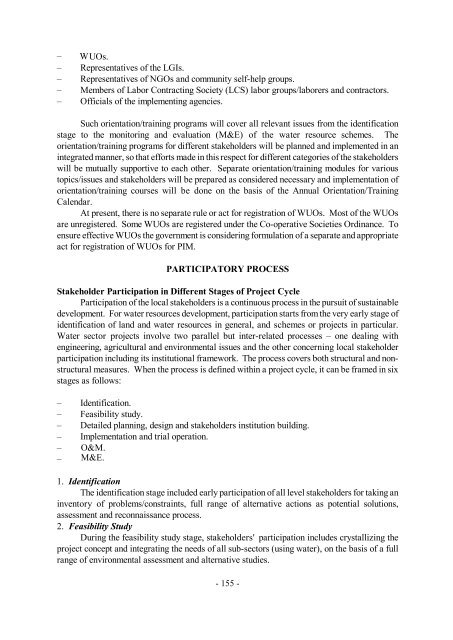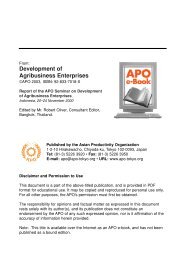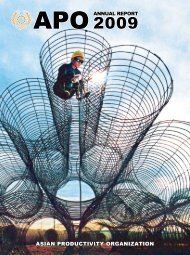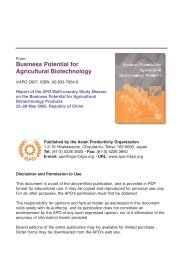Organizational Change for Participatory Irrigation Management
Organizational Change for Participatory Irrigation Management
Organizational Change for Participatory Irrigation Management
You also want an ePaper? Increase the reach of your titles
YUMPU automatically turns print PDFs into web optimized ePapers that Google loves.
WUOs.<br />
Representatives of the LGIs.<br />
Representatives of NGOs and community self-help groups.<br />
Members of Labor Contracting Society (LCS) labor groups/laborers and contractors.<br />
Officials of the implementing agencies.<br />
Such orientation/training programs will cover all relevant issues from the identification<br />
stage to the monitoring and evaluation (M&E) of the water resource schemes. The<br />
orientation/training programs <strong>for</strong> different stakeholders will be planned and implemented in an<br />
integrated manner, so that ef<strong>for</strong>ts made in this respect <strong>for</strong> different categories of the stakeholders<br />
will be mutually supportive to each other. Separate orientation/training modules <strong>for</strong> various<br />
topics/issues and stakeholders will be prepared as considered necessary and implementation of<br />
orientation/training courses will be done on the basis of the Annual Orientation/Training<br />
Calendar.<br />
At present, there is no separate rule or act <strong>for</strong> registration of WUOs. Most of the WUOs<br />
are unregistered. Some WUOs are registered under the Co-operative Societies Ordinance. To<br />
ensure effective WUOs the government is considering <strong>for</strong>mulation of a separate and appropriate<br />
act <strong>for</strong> registration of WUOs <strong>for</strong> PIM.<br />
PARTICIPATORY PROCESS<br />
Stakeholder Participation in Different Stages of Project Cycle<br />
Participation of the local stakeholders is a continuous process in the pursuit of sustainable<br />
development. For water resources development, participation starts from the very early stage of<br />
identification of land and water resources in general, and schemes or projects in particular.<br />
Water sector projects involve two parallel but inter-related processes one dealing with<br />
engineering, agricultural and environmental issues and the other concerning local stakeholder<br />
participation including its institutional framework. The process covers both structural and nonstructural<br />
measures. When the process is defined within a project cycle, it can be framed in six<br />
stages as follows:<br />
Identification.<br />
Feasibility study.<br />
Detailed planning, design and stakeholders institution building.<br />
Implementation and trial operation.<br />
O&M.<br />
M&E.<br />
1. Identification<br />
The identification stage included early participation of all level stakeholders <strong>for</strong> taking an<br />
inventory of problems/constraints, full range of alternative actions as potential solutions,<br />
assessment and reconnaissance process.<br />
2. Feasibility Study<br />
During the feasibility study stage, stakeholders' participation includes crystallizing the<br />
project concept and integrating the needs of all sub-sectors (using water), on the basis of a full<br />
range of environmental assessment and alternative studies.<br />
- 155 -
















